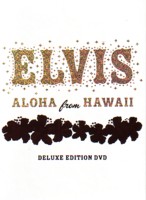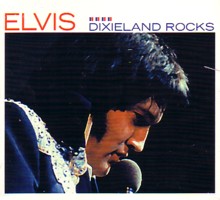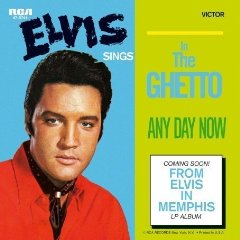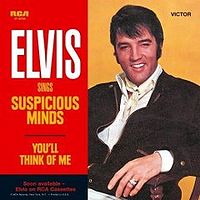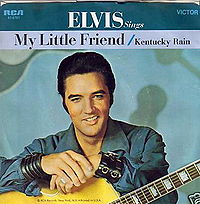'July 1969…..man walked on the moon and Elvis Presley's new album 'From Elvis In Memphis' hit the US charts.
Both events would prove to be monumental, albeit in different ways.'
Recently EIN ran a 7,000 word review on the 'From Elvis In Memphis' 2009 Sony Legacy release.
With this recent release, at last Elvis' powerful, creative musical statement had been given the respect that it was due. This is the Elvis album that should stand on hallowed ground along with the all-time classics of The Beatles, The Rolling Stones, Pink Floyd etc. .
Ernst Jorgensen was the producer of this special release and EIN's Piers Beagley was keen to ask a few questions about the finer details.
|
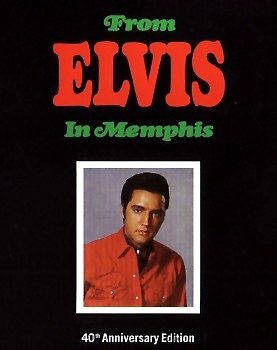 |
EIN would like to thank Ernst Jorgensen for sparing his valuable spare time to answer our questions. The interview was carried out over the first two weekends of October 2009.
SEE BELOW FOR A LIST OF OTHER EIN INTERVIEWS WITH ERNST
See below for futher comments added about the session by Marty lacker
EIN: Hi Ernst nice to talk to you again. I really enjoyed the recent BMG/SONY upgrades of Elvis’ ‘68 Comeback Special’ and the ‘Gospel’ box-set so it’s great to get ‘From Elvis In Memphis’ for the 40th Anniversary.
Was it your idea to do this 40th Anniversary Legacy edition?
Ernst: Legacy is a group of creative people, and we do things together.
EIN: ‘From Elvis In Memphis’ is such a classic album I was always disappointed that it has never had a greater impact with the general public. Like The Beatles ‘Abbey Road’ from the same year, surely it should be an album that everyone owns or at least knows about?
Ernst: It’s hard to disagree – I share the frustration and feel the same way about ELVIS IS BACK
EIN: Peter Guralnick, who reviewed it for Rolling Stone at the time, remembers that the ‘From Elvis In Memphis’ LP was released with little fanfare - and because of Elvis’ mid-sixties work he started to review it with an amount of trepidation. Was it a terrible mistake for RCA not to include ‘Suspicious Minds’ on the album and also not to use ‘Suspicious Minds’ as the album title?
Ernst. No, the album had In The Ghetto and sold well at the time. But it seems a great mistake that there wasn’t a follow up album that included the next 3 singles. Just imagine what BACK IN MEMPHIS could have done with Don't Cry Daddy, Suspicious Minds and Kentucky Rain.
EIN: You are of course quite right about the lost opportunity of leaving out those three classic singles all off Back In Memphis. Now that would have been not only a brilliant album but a brilliant strategy. Two CLASSIC Elvis albums running!
Ernst: I think it would have sold even better than FROM ELVIS IN MEMPHIS
EIN: By the late sixties albums were beginning to be the artistic key and the major seller over singles, so artists usually put their hit singles onto their LPs. Do you think that it was Colonel Parker’s old fashioned idea of ‘Greatest Hits’ albums that let ‘From Elvis In Memphis’ not get the publicity blast it needed?
Ernst: I don’t think it didn’t get publicity
EIN: I meant that at the time, every fan hung out for the ONE Beatles album each year which meant that the one album made a huge impact. Here was The Colonel putting out a classic ‘From Elvis In Memphis’ but following it with the double ‘Back In Memphis/In Person’ and the cheapo ‘Let’s Be Friends’ all within the same year. It must dilute the creative impact and lasting impression of FEIM….
|
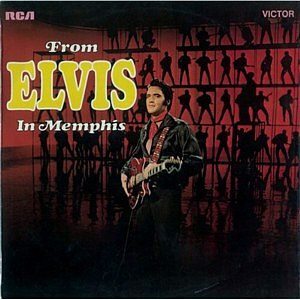 |
Ernst: I don’t think that two albums was a problem in 69 – artists were a lot more prolific in those days. However, I agree with you on the Camden album issues – overexposure to the extreme when you also consider the two 4 LP boxes that followed.
EIN: Was calling it ‘From Elvis In Memphis’ while having a photo of the Los Angeles 68 TV Special on the cover a mistake as well? It sort of suggested a continuation of the musical feel of the TV Special yet was something so new.
Ernst: Yes this looks like Colonel and RCA lack of artistic understanding
EIN: At the American Studios session Felton Jarvis seemed to take as lesser role to producer Chips Moman. Do you think the key to the amazing creativity of these sessions was Elvis’ renewed taste of creativity after the ‘Comeback Special’ or that fact that Chips Moman made him work harder?
Ernst:– Definitely a combination. Neither Felton nor Chips were in real control of the sessions. Elvis was.
EIN: While Elvis was in control, sessions engineer/producer Chips Moman (photo right: Chips & Elvis) obviously pushed Elvis harder than any other studio engineer - working him through so many vocal takes & overdubs. Listening to the session tapes you can even hear that the band had the freedom to comment on Elvis’ performance. Don’t you think that a later session with Chips Moman – for instance in 1972 – could have pushed Elvis to another session of outstanding recordings?
Ernst: Elvis always rose to the challenge when new people were around – he liked to impress. The next time with Chips would obviously not have represented that – Elvis got used to things and then often bored. Anyway, who’s to know!! |
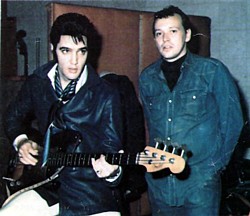 |
EIN: Chips Moman has stated that he "only considered releasing one album of songs at the time and that the weaker tracks were never supposed to have been issued". Have you ever discussed this with him and what do you feel?
Ernst: Yes, I had the privilege of spending a whole day with Chips back in the early 90s. And you are right, he only wanted one album to come out of this. However, that would never have been his decision to make – RCA just hired him. The ironic thing, for me, is that many of my favourite cuts were exactly the recordings Chips didn’t care for. He wanted modern songs, not old country, pop and blues songs,
EIN: Don’t you think that the unfinished studio version of ‘Hey Jude’ is an example of diluting Elvis’ great legacy - and a song that should have stayed unreleased? Didn’t you consider the idea of leaving it off this new compilation?
Ernst: Yes, there was a discussion on whether to include the songs that weren’t on the albums and not on the singles. I actually like "Hey Jude" – mainly for the sound and the sound of Elvis’ voice. It’s definitely not among my Beatles favourites.
EIN: The studio house band being so fresh from recording so many other classic hits appear to have had far more of a musical input to the sessions rather than take a sycophantic back-seat. Was it a mistake for Elvis not to go back to working with Chips Moman and the same intense set-up?
Ernst: I don’t know – maybe the chemistry was wrong
EIN: In 1978 RCA released the double vinyl album ‘The Memphis Record’ with different audio mixes by Rick Rowe. That album also included the shock of ‘Suspicious Minds’ without the fade & return & without the brass overdub. While it was a sensational album in its day, the mix has that 80’s audio feel & sounds a little dated nowadays. What did you think of that release at the time?
Ernst: I don’t remember, except that it LOOKED great..
EIN: Who did the audio remastering on this new ‘From Elvis In Memphis’ and is the quality a real upgrade?
Ernst: Vic Anesini and you tell me if you think it sounds better. I do, but this is not necessarily something that the average consumer will notice.
EIN: Did you find better generation tapes, or a new Studio master?
Ernst: They were the same tapes. But better transfer and mastering. However this is also subjective.
EIN: Why did the initial track suggestion fans saw for this CD apparently get changed to include the Mono mixes? |
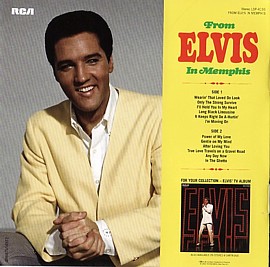 |
Ernst: Somebody send out information before we had decided
EIN: I presume the point of including the Mono mixes was to present the key versions of Elvis’ classic songs and make them available on CD for the first time? These were after all the released versions that made the charts and to #1. I find it odd that some fans have complained about not getting "stereo" versions when the recent Beatles mono releases have been highly praised!
Ernst: I understand the fans who wanted the stereos as well –and those who would have liked all the outtakes .- I’m like that, but this is a mainstream release not a collectors release.
EIN: I am presuming that the mono mixes were Felton’s productions so it is interesting that in the mono versions, the backing-vocals are often mixed lower (or even faded out) and Reggie Young’s guitar tends to be higher in the mix. The faster fade-back in Suspicious Minds (I presume for the DJs) is in itself interesting. Has any Elvis engineer Chips/Felton/Bill Porter ever commented to you about Elvis being shown the differences between mono (45rpm) and stereo (LP) versions?
Ernst: Unfortunately not, except we know that Elvis liked mono
EIN: The fact that Elvis preferred Mono to Stereo. That seems an odd statement from him as sound varies so much depending on what HiFi system it is played through. Do you know which particular mixes or songs he was talking about?
Ernst: No.
EIN: On this album several of the mono mixes sound fantastic when played through a car music system (which is I guess what they would have been designed for). ‘Rubberneckin’ and ‘The Fair’s Movin On’ are two classic examples. Have you tried this experiment yourself? (Go here for EIN's explanation of the differences in the Mono versions)
Ernst: Absolutely – it was a blast, as is mono in cars – you don’t have a proper stereo situation in cars .
EIN: Have you been saving these Mono mixes for any other considered release or was this an idea you "kinda’ stumbled upon"?
Ernst: It was an idea that came up while we were discussing the album
EIN: Most fans would presume that the mono mixes are just a mix-down from their 2-track stereo recording but we know this isn’t exactly true. For ‘Suspicious Minds’ Felton Jarvis with Bill Porter recorded two different brass overdubs for the two different stereo/mono releases. Was this common for other mono releases?
Ernst: I don’t know about the brass overdubs – doesn’t make sense to me. But we did NOT fold stereo mixes – these are ALL mono mixes from back then.
EIN: Some fans are saying they are disappointed that the Stereo versions of six tracks (including Suspicious Minds) are not included? What are your thoughts about that?
Ernst: I think everybody already has the stereos – anyway this is a mainstream release, not a collectors release.
EIN: Of course three tracks are duplicated in mono and stereo ‘In The Ghetto’, ‘Any Day Now,’ ‘You'll Think of Me’ so why not all the others?
Ernst: Because these were also on the albums and note these are new remastered versions – we have remastered everything in the last two years - most of it hasn’t come out yet.
EIN: I remember the UK ‘Elvis Hits Of the 70s’ vinyl album included several mono tracks. Was ‘Suspicious Minds’ even released in Stereo while Elvis was alive? Would Elvis himself have ever heard the song in Stereo?
Ernst: I don’t know
EIN: Who was instrumental in producing these Mono mixes and were they created just to have that extra impact on AM radio?
Ernst: I assume Felton did them – I’m almost 100% sure, but in some cases there is no paperwork
EIN: You also worked on the 1999 BMG release ‘Suspicious Minds’ which also covered Elvis’ Memphis sessions. What makes this Legacy edition the definitive release?
Ernst: I think we have the best sound ever on these recordings.
EIN: To keep Elvis’ legacy alive we need the younger generations to re-discover what great music the man created. If you had to suggest two Elvis albums, CDs or compilations to today’s teenagers to get them hooked on Elvis, which would you choose? Would FEIM be one of them?
Ernst: I still think the hits are the way to get new people interested. HITSTORY would serve that purpose.
EIN: I realise that this release is aimed at the general public. Outside of the singles, what songs are the core tracks that you think people who don’t know the original album will be excited to discover?
Ernst: I can’t say, but my favourites when I bought the album were AFTER LOVING YOU and I’ll HOLD YOU IN MY HEART – today I think it’s impossible to name a favourite
EIN: As an Elvis fan it has always upset me that the three classic albums, Elvis, Elvis Is Back and From Elvis In Memphis weren’t sitting in every record store in the Elvis racks. Surely this should have been a mandatory sales approach before they loaded the shelves up with cheap compiles and albums like ‘Elvis sings for Children and Grownups Too’! Didn’t you feel the same exasperation?
Ernst: Disgusted was the appropriate way to describe my feeling at the time.
EIN: I was a little disappointed here in Australia with the lack of tie-in publicity that came with last year’s ‘The Complete Comeback Special’ release. Did that sell as well as hoped - and what can SONY do to get his CD to the front racks of the shops?
Ernst: Not my area – I don’t know
EIN: The kick-ass ‘A Little Less Conversation’ remix was an Elvis producer’s dream and started up a brand new Elvis era. My teenage friends suddenly understood my passion! What are your hopes for something else magical down the track?
Ernst: No idea – but lots of hope
EIN: David Bendeth included some of the FEIM tracks on his 5.1 Audio DVD. Wouldn’t you love to have the whole 1969 session released as a 5.1 surround sound disc?
Ernst: Not really – I’m old fashioned – I like stereo
EIN: There are still plenty of outtakes – even if they are mostly NOT complete takes - available from these American Sessions? The early takes of Elvis working on ‘Suspicious Minds’ are fascinating. Do you have any future projects that might see these officially released?
Ernst: That’s more likely to be an FTD release.. .
EIN: In an interview RCA’s Joan Deary "That whole Memphis recording collection was incredible, and yet Elvis never went back and recorded with Chips again. I'm not sure why. Maybe it was the influence of Hill and Range, which had always had a big piece of the publishing on other Presley records. They certainly lost their total control when Chips entered the picture." Did you ever get to talk with Joan Deary about her thoughts of this particular session and do you think the Hill and Range deal had a lot to do with Elvis never going back to American Studios?
Ernst: No
EIN: I believe that Joan Deary was working on a soundboard release potentially called "Opening Night" which was in fact the recording of Elvis’ sixth live 1969 show in Vegas. Being such an early show Elvis sings versions of his Memphis songs that are more like his session recordings than his later live shows. Do you have any future plans to release this show officially?
Ernst: Sounds like a possible FTD release – how do you know the exact date (As you write, it’s definitely not opening night)
EIN: Is there anything else you would like to add about this FEIM release?
Ernst: I hope I get to do more deluxe versions like this
EIN: It IS a great opportunity to get Elvis’ key albums the status they deserve with the general public. What other Elvis albums would you like to follow up with if you get the chance to do more Deluxe releases?
Ernst: There are so many – I’m only really interested if we can come up with a marketing and publicity angle that works. If we don’t get peoples attention (and I’m not talking about the dedicated Elvis fans), we are wasting out time. His first album and ELVIS IS BACK are however VERY tempting |
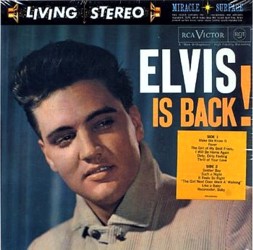 |
EIN: Thanks for talking with us – and keep up the great work that you & Roger Semon do, it really is appreciated.
Interview by Piers Beagley
-Copyright EIN, October 2009
Click to comment on this review
GO HERE for EIN's 7,000 word in-depth review of the new Legacy From Elvis In Memphis release
For full FEIM Legacy Release Tracklisting, more inside booklet images & full SONY releases details go here
The SONY 'F.E.I.M Legacy' double-cd release is available for only $12 from Amazon - and in Australia for AU$25 from your local JB HiFi. Every Elvis fan should purchase this quality bargain, and get Elvis back in the charts.
MARTY LACKER adds some interesting comments
Marty Lacker was a best friend to Elvis and who also worked at American Studio with Chips Moman. He wrote to EIN discussing what Ernst said in the above interview about ‘From Elvis In Memphis’. He made some interesting points.
Because of the Marty’s comments EIN asked him a few more pertinent questions about Chips Moman and the American sessions.
Marty Lacker; "From my point of view and the time I spent at American and with Elvis, Ernst’s opinion on what would happen if Elvis would have done another session with Chips shows how much Ernst didn't personally know Elvis. Nor does he really know that Chips would have pushed Elvis just as hard. Chips did that with everyone he produced no matter how many times he produced them."
EIN: Does Chips regret not having done another session with Elvis?
(There is this quote from Chips. "Later I thought to myself, "It sure was a privilege to have worked with him. I wish I had realised that at the time we were recording, 'cause there's a lot of things that I would have liked to have said to him.")
Marty Lacker: Yes, and at first it bothered him that for whatever reason Elvis would not come back to American but he knows now why that didn't happen and the workings of Parker, Felton Jarvis and a former American arranger for telling Elvis a lie about chips.
He knows what he produced for Elvis was damn good.
EIN: Would Chips have pushed Elvis as hard second time around?
Marty: Absolutely! That was one of Chips' traits in the studio no matter who he was producing and it mattered not how many times he produced them, he was always the same. That's why almost every record he produced became a big hit, all 120 plus hits he cut. It mattered not who it was and in addition to Elvis he cut some very big artists.
EIN: After Elvis' massive success with the Chips SINGLES, would Elvis have allowed himself to be pushed as hard in the next session.
Marty: Yes! Because Elvis enjoyed his records for the first time in 8 years being on the top of the charts and he saw how it contributed to his financial success as well as his success with the crowds during his first tours after and Vegas. People shouldn't underestimate the power of those hit records after he had been basically off or far down in the charts the years before because of his horrible movie songs.
EIN: What stopped you persuading Elvis to go back to American Studios one more time?
Marty: Nothing! I tried in Vegas one night, he told me that he would never go back there after I mentioned it to him. I asked him why and he told me what he was told. Some of the guys were standing in front of where we were sitting by the windows including Felton. I told Elvis that whoever told him that was telling a lie and I looked straight at Felton and added," Elvis, they told you that because they want you to cut back in Nashville because it fits their agenda not yours.. You cut some great records with chips." I also knew that Parker was part of it because he lost control, for the first time of an Elvis session. He thought Chips was responsible for it and he didn't like the fact that chips wouldn't give them publishing on ‘Suspicious Minds’.
Elvis got mad at me for a moment because he thought I was taking Chips' side over his. I explained to him that my loyalty was to him, that I hated to see him not go back to American because it was good for him and because those people who told him that crap were only concerned with their own agenda.
EIN: Chips Moman was there in Memphis this year at the celebration of the re-release. Did he tell you how he felt about being there and whether he feels he is getting the credit he deserves (for FEIM) at last?
Marty: At first he said he wouldn't come to Memphis but then Bobby Wood called him and told him the band would like for him to be there. He had planned to say something to Ernst about the Grammy and taking credit for the (re-released FEIM) album because it really stuck in his craw that others were being recognized for his work.
Once he got to the auditorium he was enjoying talking to the fans that he decided to let it go but he still feels the same way and I don't blame him.
Elvis, Chips and the band are the ones who produced that great album and they are the ones who should receive the accolades not someone who just re-arranged the tracks as they appear on the album or change the cover or made it digital. If the music that chips produced wasn't any good than no amount of digital remastering would have made it any better.
I also mean nothing personal against Ernst, I really don't know him as we only met once for about an hour years ago when he was here for an EPE event at the Peabody hotel and he seemed like a nice guy.
- MARTY
For more EIN interviews with Ernst Jorgensen and about Elvis releases check out EIN's informative articles:
'Ernst Jorgensen talks about Elvis Presley': Two very interesting interviews with Ernst Jorgensen from the TCM movie channel feature on YouTube.
In Part 1 Ernst talks about his early discovery of Elvis as well as missing tapes & discovering Elvis' private gospel recordings.
"To really appreciate music today, you need to know where it came from. That's a fascinating road."
Click here for Part 1 - 10 minutes
In Part 2 Ernst talks about rare discoveries from Elvis movies, Priscilla playing Ernst 'My Happiness' for the very first time and why Elvis is the most important of them all.
"I don’t think we ever got to see Elvis as an actor in a proper setting."
Click here for Part 2 - 10 minutes.
|
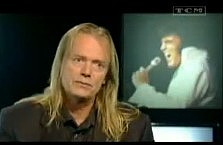
|
Ernst Jorgensen in 2007 talks about the future SUN project
Ken Sharp's 2006 in-depth interview with Ernst Jorgensen
Ernst's 2006 interview about the 'Easter Special' FTD
Ernst's interview about the 'Southern Nights' FTD
Ernst's interview about the 'Summer Festival' FTD
Ernst Jorgensen & Roger Semon's 2002 discussion about the FTD label and their future releases. An EIN exclusive.
Go here for the Ernst Jorgensen in-depth 2002 interview by Arjan Deelen EIN exclusive.
EIN Website content © Copyright the Elvis Information Network.
Elvis Presley, Elvis and Graceland are trademarks of Elvis Presley Enterprises.
The Elvis Information Network has been running since 1986 and is an EPE officially recognised Elvis fan club.



